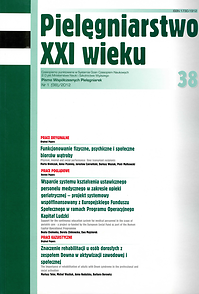The importance of rehabilitation of adults with Down syndrome in the professional and social activation
Keywords:
Down’s syndrome, rehabilitation, vocational activation of persons with mental disabilitiesAbstract
THE IMPORTANCE OF REHABILITATION OF ADULTS WITH DOWN SYNDROME IN THE PROFESSIONAL AND SOCIAL ACTIVATION
In many countries of the world, and Poland, over the years, there have been undertaken activities that are designed to create the conditions for full participation in professional and social life of adults with Down syndrome. This syndrome is one of the best known and described medical genetic disorders. The paper is presenting aspects of the education of mentally disabled people, which play a key role not only in the socio-professional sphere, but also the economic and financial one. The therapeutic methods used in the activation and rehabilitation, which have a significant impact on future development and career opportunities of people with Down syndrome are described here. The studies illustrate the importance of Occupational Therapy Workshops, which are one of the steps in starting work by people with disabilities. Based on observation and analysis of data it has been showed that the activities carried out at the workshops not only improve but also teach new professional skills and social behaviour, and thus increases the possibility of finding a job and functioning in society. People with Down syndrome can be treated as a social minority, which is slowly coming out of isolation, due to the appropriate way of education, rehabilitation and social integration, on the other hand, it changes the perception of people with disabilities by the general public.
References
1. Zań M. Cele i zadania terapii zajęciowej. 2003. 1-2.
2. Radecki AB. Identyfikacja przyczyn niskiej aktywności zawodowej osób niepełnosprawnych. Warszawa. 2008. 10-3.
3. Janaszek P. Warsztat Terapii Zajęciowej szansą na godne życie osób z ciężkim kalectwem. Warsztat Terapii Zajęciowej. Konin. 1995. 3. 55-0.
4. Zań M. Rola Warsztatów Terapii Zajęciowej w rehabilitacji osób niepełnosprawnych. 2004. 1-2.
5. Piotrowicz RJ. Jakość życia w subiektywnej ocenie osób niepełnosprawnych jako podstawa konstruowania programów rehabilitacji społecznej. Człowiek Niepełnosprawność Społeczeństwo. Akademia Pedagogiki Specjalnej. 2005. 164-74.
6. Sadowska L. Postępy w diagnostyce, terapii i rehabilitacji dzieci z zespołem Downa na podstawie 15-letnich doświadczeń własnych. Zespoł Downa. Postępy w leczeniu, rehabilitacji i edukacji. Wrocław. TWK Typoscript. 2008. 27-8.
7. Filipek ER. Praca zawodowa osób niepełnosprawnych jako element rehabilitacji kompleksowej. Wybrane zagadnienia z aktywizacji zawodowej osób niepełnosprawnych. Lublin. Norbertinum. 2008. 75.
8. Midro A. Genetyczna ruletka. Z myślą o Tobie. Informator dla rodziców z zespołem Downa. 2005. 10.
9. Unger DD. Praca w społeczności lokalnej dzięki zatrudnieniu wspomaganemu. Ku lepszej przyszłości. Zespoł Downa. Przewodnik dla rodziców i opiekunów. Zakrzewo. Replika. 2009. 339-56.
10. Zausmer E. Wczesne pobudzanie rozwoju dziecka. Ku lepszej przyłości. Zespół Downa. Przewodnik dla rodziców i opiekunów. Zakrzewo. Replika. 2009. 144-45.
Downloads
Published
Issue
Section
License
Copyright (c) 2012 Mariusz Teter, Michał Wasiluk, Anna Nadulska, Barbara Borowicz (Autor)

This work is licensed under a Creative Commons Attribution 4.0 International License.




